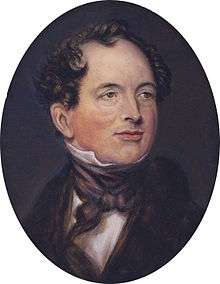Believe Me, if All Those Endearing Young Charms
"Believe Me, if All Those Endearing Young Charms" is a popular song written in 1808 by Irish poet Thomas Moore using a traditional Irish air.
Origins of the melody
The tune to which Moore set his words is a traditional Irish air, first printed in a London songbook in 1775.[1] It is occasionally wrongly credited to Sir William Davenant, whose older collection of tunes may have been the source for later publishers, including a collection titled General Collection of Ancient Irish Music, compiled by Edward Bunting in 1796. Sir John Andrew Stevenson has been credited as responsible for the music for Moore's setting.[2]
It is thought that after Moore's wife, Elizabeth, was badly scarred by smallpox, she refused to leave her room, believing herself ugly and unlovable. To convince her his love was unwavering, Moore composed the ‘Endearing’ poem which he set to an old Irish melody and sang outside her bedroom door. He later wrote that this restored her confidence and re-kindled their love.
Lyrics
The lyrics, as originally published in 1808 in A Selection of Irish Melodies, are as follows:[3]
- I.
- BELIEVE me, if all those endearing young charms,
- Which I gaze on so fondly to-day,
- Were to change by to-morrow, and fleet in my arms,
- Like fairy-gifts, fading away!
- Thou wouldst still be ador'd as this moment thou art,
- Let thy loveliness fade as it will;
- And, around the dear ruin, each wish of my heart
- Would entwine itself verdantly still!
- II.
- Would entwine itself verdantly still!
- It is not while beauty and youth are thine own,
- And thy cheeks unprofan'd by a tear,
- That the fervour and faith of a soul can be known,
- To which time will but make thee more dear!
- Oh! the heart, that has truly lov'd, never forgets,
- But as truly loves on to the close;
- As the sun-flower turns on her god, when he sets,
- The same look which she turn'd when he rose!
Other uses of the melody
Other than "Believe Me, If All Those Endearing Young Charms", the tune is perhaps best known as the melody to "Fair Harvard", the alma mater of Harvard University. A seventeenth-century folk song, Matthew Locke's "My Lodging is in the Cold, Cold Ground", was set to this tune some time after its original setting to a different, also traditional, air.[4] Simone Mantia, a pioneer of American euphonium music, composed a theme and variations on the melody, which remains a staple of the solo euphonium literature.
The first verse, as originally written, was sung by the character "Alfalfa" in a 1936 episode of MGMs "The Little Rascals" entitled "Bored of Education." The tune, with the Endearing Young Charms title, also became a staple of Warner Brothers cartoons, appearing first in Private Snafu short Booby Traps. Subsequent uses included the 1951 Merrie Melodies animated cartoon Ballot Box Bunny, 1957 short Show Biz Bugs, 1965 Road Runner cartoon Rushing Roulette, and finally in a new twist on the gag, with Slappy Squirrel's 1993 introductory episode, "Slappy Goes Walnuts", from Animaniacs. Variations were also done in the 1963 Andy Griffith Show episode "Rafe Hollister Sings", and the 2010 South Park episode "Crippled Summer".[5] In its cartoon appearances, the song is often the cue for a classic "bomb gag" wherein the playing of the first line of the song sets off a rigged explosion on the final note. The gag is so well known that it is often called "The Xylophone gag".
The first line appears in some versions of Dexys Midnight Runners' "Come On Eileen" as an introduction played by a solo fiddle.
Roger Quilter's setting of the song was included in the Arnold Book of Old Songs, published in 1950.
References
- ↑ Songs of Yale. New Haven: Yale Glee Club, 2006. p. 150. The website http://www.contemplator.com/, used in a later reference in this article, claims its first printing was in 1737.
- ↑ William Davenant, 1606-1668. http://www.pdmusic.org/biographies/Davenant%20William%20Davenant.pdf, accessed Feb. 3rd, 2010.
- ↑ Moore, Thomas (1808). A Selection of Irish Melodies: Second Number. Dublin: W. Powers. pp. 98–102. Retrieved 7 August 2015.
- ↑ My Lodging It Is On the Cold Ground. http://www.contemplator.com/england/lodging.html, accessed Feb. 3rd, 2010.
- ↑ http://www.southparkstudios.com/clips/307810/ukulele-solo
